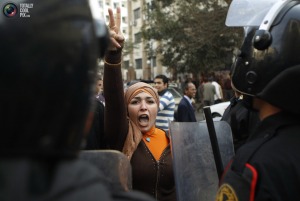QUNFUZ: Sovereignty
My past experience talking to Egyptians, in Egypt and around the world, is that 95% of them hate Husni Mubarak and the humiliation he’s brought upon their once great country. When I ask of their hopes for change, they answer with the bitter resignation common to all Arabs: “Nothing will change. His son will come after him. People are more interested in football, or their next meal.” Arabs from other countries also despair of escaping their state of stagnation. Some like to repeat the Arabic phrase al-‘arab jarab, or ‘the Arabs are scabies.’
But that was then. That was until the Tunisian revolution, which has now reached the centre of the Arab world. Egypt’s Friday of Rage was a beautiful revolutionary moment, when individuals, having witnessed the strength of their protesting compatriots over the previous days, suddenly realised they were not alone. After Friday prayers, a nation claimed sovereignty over its streets – young people, the unemployed, professionals, workers, students, families. The people who didn’t demonstrate provided food, drinks and tear gas remedies to those who did (which means that womens’ participation has been much greater than TV pictures show). On at least one occasion, Christians guarded a Muslim mass prayer under assault by police.
And in Suez, Luxor, Alexandria and Cairo they defeated the police. They torched police stations and police vehicles, as well as the headquarters of the ruling (and absurdly named) National Democratic Party. (The Israeli embassy, meanwhile, has helicoptered its entire staff out of Cairo. One slogan being chanted: ya mubarak ya ameel/ ba’at biladak l-isra’il, or ‘Mubarak you Foreign Agent, You Sold your Country to Israel.’ Tonight the only Israeli flag flying in the Arab world is in Amman.)
On Friday night, well past the point at which the regime lost control, Pharaoh deigned to address his servants. Although the old soldier appeared physically strong, it was a comically bad speech he made, in the circumstances no more than a provocation. He began by saying that none of this chaos would have broken out had his regime not offered the people so much freedom. He repeated the structure ‘I’ve always been concerned with (the poor, freedom, etc)… and I will remain concerned with it.’ Campaigning on your past record doesn’t seem at all wise when there are crowds outside demanding your blood.
From an American/ Zionist point of view, there would have been more chance of containment if Mubarak had been sacrificed on Friday. So far the sacrifice has reached the son and presumptive heir Gamal Mubarak, who’s fled with his brother to London. When Mubarak senior appointed Omar Suleiman as vice president on Saturday, he signalled Suleiman as his successor. Suleiman is a top regime secret service man, and the favoured link to Israel and the Palestinian Authority. Protestors immediately poured scorn on him.
When the police were driven off, the army moved in. The soldiers were welcomed by protestors, and made no attempt to enforce Mubarak’s curfew. Some, including officers, have joined the crowds. A captain was carried on the shoulders of Cairenes to rip down a picture of Mubarak. Protestors danced on top of tanks.
Still nobody knows if the army is going to stand decisively with the people or the regime. Not even the army knows. The only certain thing is that revolutionary energy has been unleashed throughout society as a whole, including the army, and that it’s not about to jump back in the bottle.
In a very different context, I’ve experienced a little bit of urban chaos breaking out in a repressive state. In that case the chaos was permitted and guided by the regime (the episode is fictionalised here), but even then I could sense a potential explosion in the atmosphere. When the lid comes off a pressure cooker, steam rushes out. That, and the freeing of prisoners from the torched police stations, is behind some of the looting and vandalism now occurring in Egypt. The complete absence of police from their civil duties magnifies the trouble (and while buildings burn, no fire services appear). As happened in Tunisia, there are eyewitness reports of known interior ministry thugs directing the looting. And again, as in Tunisia, Egyptians are solving the problem themselves by forming neighbourhood defence committees. If the hooliganism increases there is every reason to suspect that it’s the planned precursor to a military crackdown, although that may not work, for reasons given above.
Obama advises both sides against violence, equating unarmed freedom fighters with a torture-chamber state. At least a hundred people have been murdered in the last twenty four hours by US-supplied live and rubber bullets. US-supplied tear gas chokes the people’s throats. But Obama calls for dialogue. The dialogue the regime has practised for three decades involves, on one side, its truncheon, and on the other, the people’s anus (anyone who knows anything about Egyptian police stations will know this is a very literal metaphor). The Egyptians know all about regime dialogue, and they don’t want it. What they want is the fall of the regime. You only need to switch on the TV to hear it in its urgent rhythm: ash-shaab/ yureed/ usqaat an-nizam. There’s no two ways about it.
This afternoon I made the mistake (I was driving) of listening to the BBC. A historian on Any Questions said that most of the protestors were “decent people,” but that there was a danger the Muslim Brotherhood would snatch the revolution, and the Muslim Brotherhood is after all linked to Hamas. Apparently a Fox News commentator warns that Egypt could fall to al-Qa’ida groups. This is nonsense in many ways. First, the Egyptian Muslim Brotherhood is noted for its aversion to violence. Ayman Zawahri and the al-Qa’ida types broke away from the Brothers for precisely this reason. Second, the Brotherhood by its own admission has not led the revolution, no more than Muhammad al-Barade’i or any other leader. Third, the Brotherhood is part of the revolution like almost every other segment of Egyptian society, because it is part of society, a venerable institution and a mass movement.
If the revolution has an ideology, it’s one of representation and dignity, of democracy in other words. The Brotherhood, like Barade’i, has called for an interim national government with no NDP presence, followed by elections. If the Brothers win elections, they will not be in a position to establish a new dictatorship. Fourth, the most retrograde elements of Islamism, those that lead to nihilistic terrorism and sectarian hatred, are nourished by the social stagnation of dictatorship. Finally, it is not for British or American chatterers to decide whether the Egyptians are ready for freedom. The Egyptians are demanding freedom, and are making the chatterers irrelevant.
Mubarak’s new prime minister is Ahmad Shafiq, former minister of aviation. Has he been chosen to fly the president into exile?
Robin Yassin-Kassab is a UK-based writer, blogger, and journalist. This column originally appeared in his blog. Reprinted with his kind permission.
























